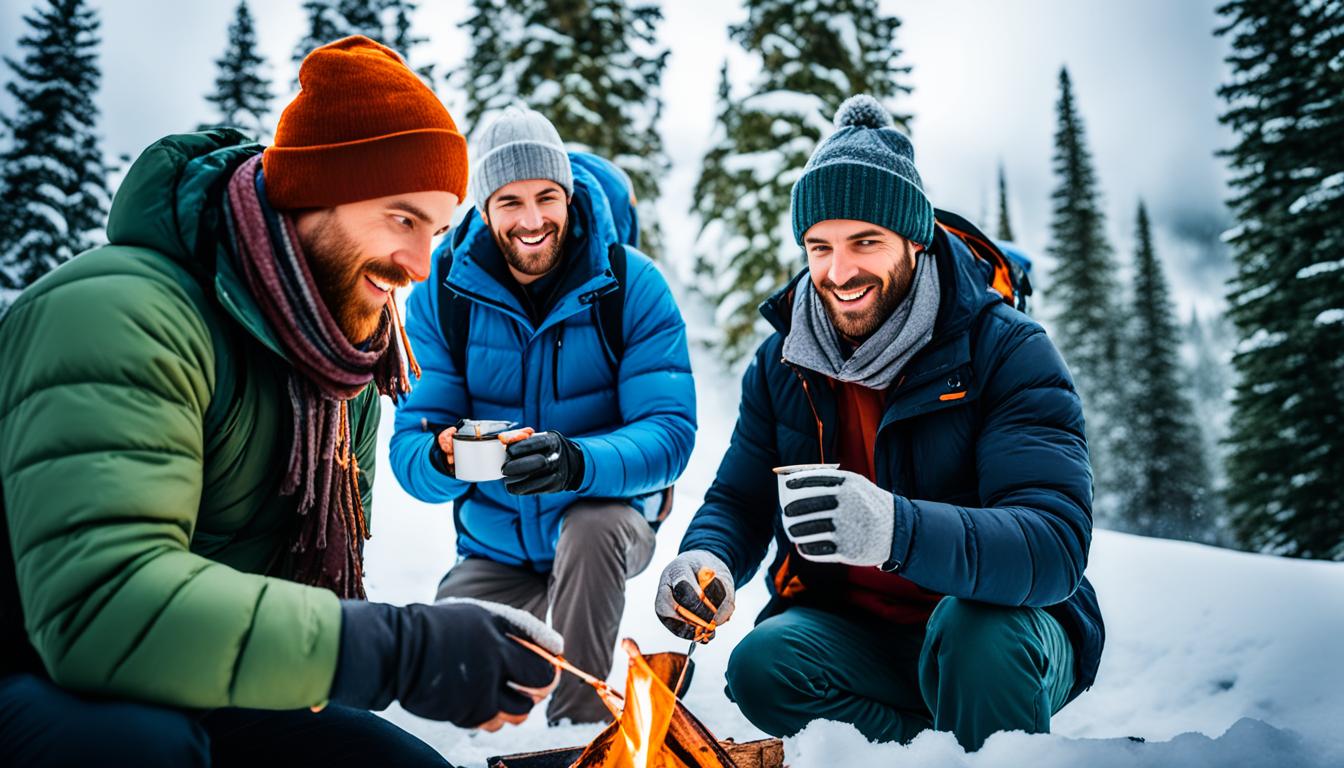Winter camping can be exciting and rewarding for outdoor lovers. It’s important to be well-prepared for a safe and warm trip. This guide will give you the best tips for winter camping.
Key Takeaways
- Invest in high-quality, insulated gear to keep you warm and dry
- Choose a well-protected campsite with natural wind breaks
- Layer your clothing to maintain body temperature and manage moisture
- Regularly check for signs of frostbite or hypothermia
- Pack extra supplies and plan for potential emergencies
Essential Winter Camping Gear
Staying warm and comfy in winter camping needs the right gear. You’ll need insulated sleeping bags and pads, plus reliable outerwear. These items are key to a good winter camping trip.
Insulated Sleeping Bag and Pad
For winter camping, a good insulated sleeping bag is a must. Choose one that fits the weather you expect, with a draft collar and hood. Add an insulated sleeping pad to keep you warm and off the cold ground.
Warm and Waterproof Outerwear
Keeping warm and dry is key in winter. Get a waterproof and breathable jacket and insulated pants. Layering with base, mid, and outer layers keeps you warm and dry, no matter the weather.
| Item | Description | Key Features |
|---|---|---|
| Insulated Sleeping Bag | High-quality, down-filled sleeping bag with a temperature rating suitable for winter conditions. |
|
| Insulated Sleeping Pad | Thick, insulated sleeping pad that provides a barrier between you and the cold ground. |
|
| Waterproof and Breathable Jacket | Outer shell jacket that keeps you dry and protected from the elements. |
|
| Insulated Pants | Warm, insulated pants that provide protection from the cold and snow. |
|
With the right winter camping gear, you’re ready for the cold outdoors. The right insulation, waterproofing, and layering keep you warm and dry. Enjoy your winter camping trip with comfort and peace of mind.
Winter Tent Setup and Site Selection
Finding the right spot and setting up your tent right are key to staying warm in the cold. These tips will help you make a cozy winter campsite. It will keep you safe from the cold.
Selecting the Campsite
Look for a campsite with windbreaks like forests, ridges, or rocks for winter camping. Stay away from open, high places with strong winds and lots of snow. Choose spots that are covered and protected.
- Seek out areas with natural insulation, like pine tree stands or thick brush
- Choose a site that is well-drained to prevent water accumulation
- Avoid setting up camp in low-lying areas that may collect cold air
Pitching the Tent
Setting up your tent right is key to staying warm and keeping snow out. Use strong poles and stakes made for winter. Make sure your tent is tied down well.
- Clear a level, well-drained area for the tent foundation
- Dig a shallow trench around the tent to prevent water and snow from entering
- Use guy lines to stabilize the tent and prevent it from collapsing in high winds
- Insulate the floor with a foam pad or insulating mat
By picking a good spot and setting up your tent well, you’ll have a warm and safe place for your winter adventures.
| Campsite Considerations | Tent Setup Essentials |
|---|---|
|
|
“Proper tent setup and site selection are the foundation of a successful and comfortable winter camping trip.”
Winter Camping Tips
Going on a winter camping trip is exciting but needs the right prep and survival skills. This guide will help you build a warm campfire and navigate snowy areas. It’s all about being ready and knowing what to do.
Mastering the Winter Campfire
A warm campfire is key for warmth and cooking. Start with dry, seasoned firewood and a good fire starter. Pick a spot that’s safe from snow and build a fire pit to keep the fire going.
Navigating the Snowy Terrain
Walking in snow can be tough, but you can do it safely. Use snowshoes or skis to stay on top of the snow. Take breaks and know the area to avoid danger.
Winter Survival Essentials
- Insulated water bottle or thermos to keep your drinks from freezing
- Emergency blanket or sleeping bag liner to provide additional warmth
- Lightweight, portable stove for heating meals and melting snow for water
- Signaling devices such as a whistle or flares in case of emergency
Follow these tips for a safe and fun winter camping trip. Being prepared and flexible is key to success.
“The essential joy of being with horses is that it brings us in contact with the rare and valuable elements of life itself.”
Layering for Winter Camping
Creating the right layering system is key to staying warm and comfy while camping in winter. You need three main layers: base, insulating, and outer shell. This system changes with the weather and keeps you dry and warm.
Base Layer
The base layer is the first layer you wear. It takes away moisture and keeps your skin dry. Choose lightweight, moisture-wicking fabrics like merino wool or synthetic materials. They move sweat away from your body to prevent getting cold.
Insulating Layers
Insulating layers keep your body heat in. Pick mid-weight to heavyweight clothes with insulating materials like down or synthetic fills. These layers help keep you warm in very cold weather.
Outer Shell Layer
The outer shell layer protects you from wind, rain, and snow. Get a waterproof and breathable jacket and pants from tough, weatherproof fabrics like Gore-Tex. This layer keeps you warm and dry during your winter camping trip.
